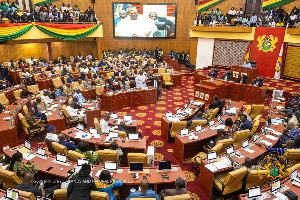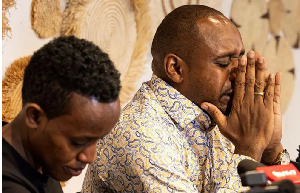Tamale, March 29, GNA - A Senior Lecturer at the University of Development Studies (UDS) has expressed concern over the rate at which shea trees are being destroyed to make land available for the cultivation of other economic trees such as cashew and mango.
Dr Joshua Adam Yidana, who expressed the concern, warned that if measures were not taken to check the practice, a time would come when the country would not be able to meet international demand for shea butter.
Dr Yidana was speaking at a one-day inter-regional conference on the development of the shea industry in Northern Ghana in Tamale on Wednesday.
The Tung-Teiya Shea Butter Extraction Women's Association (TUSEWA), a local NGO, organised the forum on the theme: "Moving the shea butter industry forward: Prospects and challenges." The Business Sector Advocacy Challenge (BUSAC) Fund sponsored the event.
The conference brought together stakeholders in the shea industry from the Northern, Upper East and Upper West Regions to brainstorm to promote the development of the industry in Northern Ghana.
Dr Yidana said the country had a total population of 94 million shea trees, which produced about 150 tonnes of shea butter. Sixty per cent of the shea butter produced is used internally while 25 per cent is exported.
He said more than 2.5 million tonnes of shea kernel produced worldwide were used for the production of cosmetics, pharmaceuticals and confectionery and edible fats.
He said unlike cocoa and other products, which had synthetic substitutes the shea nut tree had no substitute adding that consumers now preferred organic or natural products.
Alhaji Abubakar Saddique Boniface, Northern Regional Minister in a speech read for him, acknowledged the economic importance of the shea tree in the lives of rural women and emphasised the determination of government to provide support for the growth of the shea industry in Northern Ghana.
He appealed to traditional rulers to take pragmatic measures to protect the trees from bushfires and indiscriminate felling. The Regional Minister called on civil society organisations and other development partners to collaborate with the government to use the development of the shea resource as a means for poverty reduction in Northern Ghana.
Dr David Mensah, Director of Northern Empowerment Association, an NGO, called for the establishment of refineries to process the shea nuts for export to earn foreign exchange for the country and create jobs for the people.
He appealed to the government to give a fixed price for every bag of shea nut as it was done to cocoa to save the rural women from being cheated by market women who virtually bought the shea nuts "at give away prices".
Madam Stella Nitori Chairperson of TUSEWA noted that if the shea industry was promoted and well developed, it would accelerate economic growth and help reduce poverty in the rural communities.
She said BUSAC in collaboration with other organisations was undertaking an advocacy action plan to gather information and ideas to influence government to come out with pragmatic policies and initiatives for the development of the shea industry to secure good market for its members.
The action plan would also involve the training of members in quality control of their products.
Regional News of Wednesday, 29 March 2006
Source: GNA












